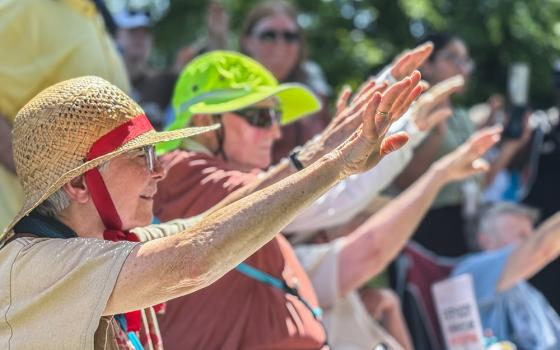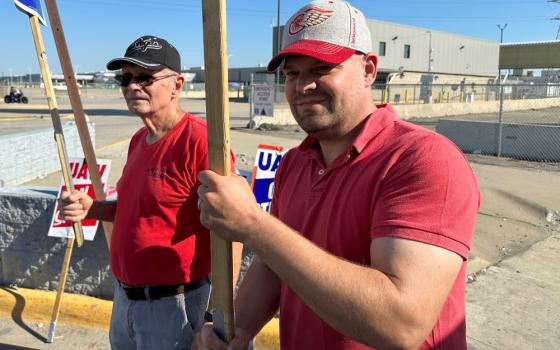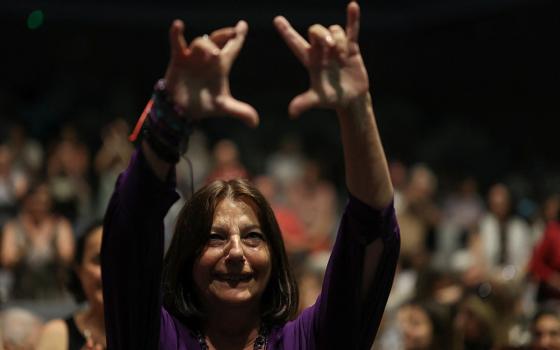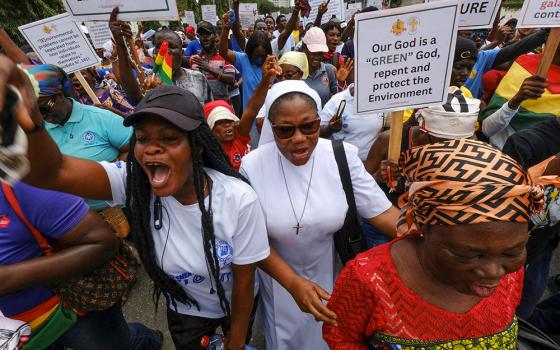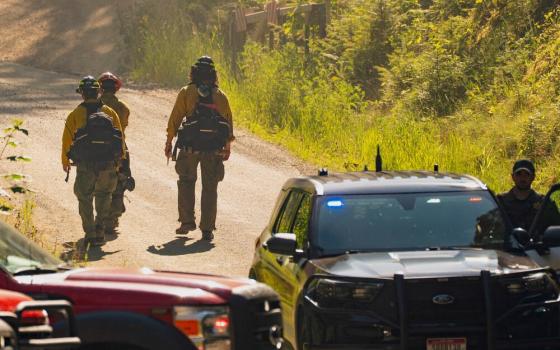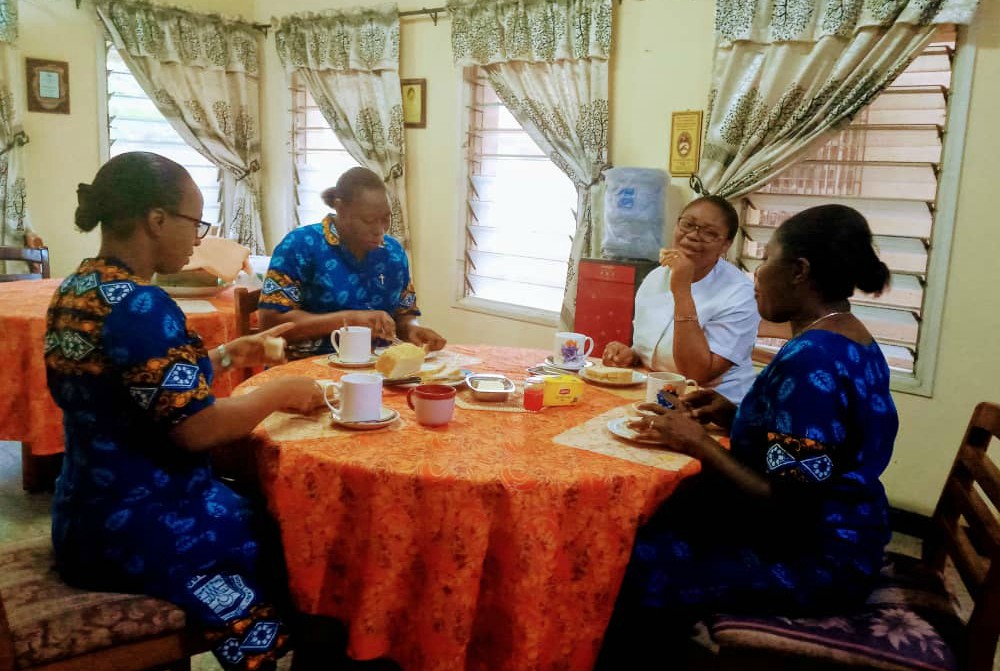
The Religious Sisters of Charity in Lagos, Nigeria, eat breakfast together while maintaining social distancing and avoiding physical contact. (Courtesy of the Religious Sisters of Charity)
How is the coronavirus affecting your community? Submit an example we may use in future coverage.
Sisters' communities and congregations worldwide are responding to the COVID-19 pandemic by trying to protect their most vulnerable members, maintain a sense of community while practicing safety guidelines, and help others as they can.
Congregations around the world shared with Global Sisters Report how they are reacting to the crisis. Sisters are increasing their time spent in prayer, individually and collectively. Some are hosting online prayer services, discussion groups and community listening sessions. Some are making masks for health care workers. Others are carrying on ministries on a limited basis. Some are opening buildings to house health care workers. Others are taking in homeless people during the lockdowns. Sisters in some congregations in Asia and Africa are rationing food for themselves to donate to those in need in surrounding communities.
This is the second sampling of actions congregations have taken. Read the first part. Want to share about your congregation or community? Click here to submit an example we may use in future coverage. You can find all of GSR's coverage of the coronavirus here.
Bangladesh
Mary Queen of the Apostles
"We are attending prayer 24 hours each day so that the world's people can overcome COVID-19," said Sister Mary Lily, a member of the Mary Queen of the Apostles congregation, explaining that several sisters are taking turns to pray a 24-hour devotional prayer.
Normally, the sisters pray 30 to 60 minutes every morning, afternoon, evening and night.
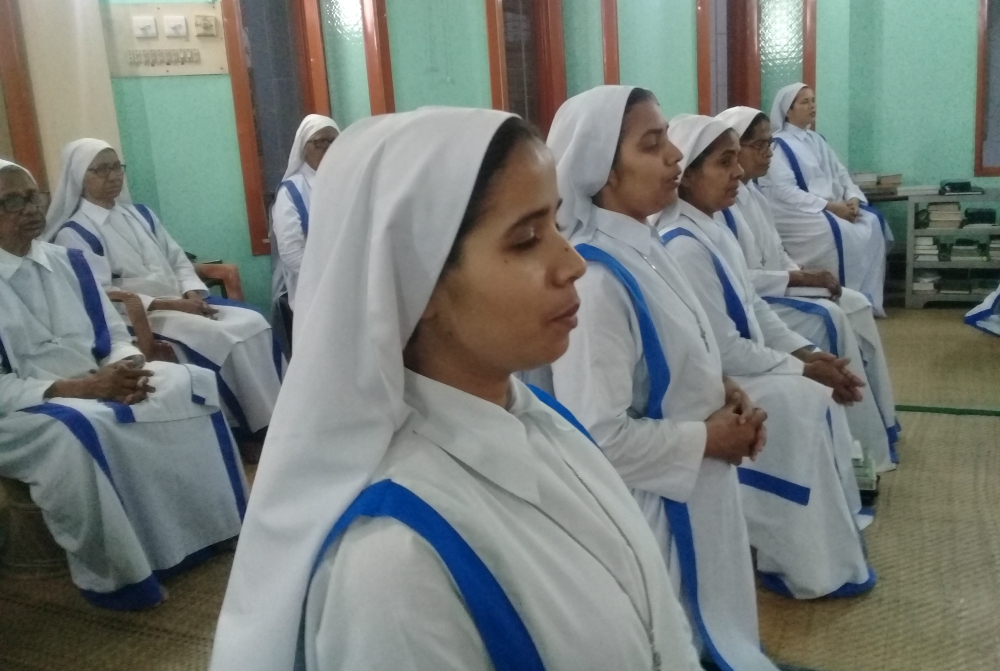
Sisters of the Mary Queen of the Apostles in Bangladesh take turns participating in a 24-hour devotional prayer for those affected by the coronavirus, for health care workers, and for scientists to create an antidote or medicine to treat the virus. (Sumon Corraya)
"Now, our main responsibility is to pray for those affected by the deadly virus," said Sister Mary Lily, who is the superior of Mary House, a diocesan convent with 40 sisters in the capital of Dhaka's Tejgaon region. "We pray for doctors and nurses, for their good health. We also pray for scientists so that they can make an antidote or medicine for COVID-19 with help of God."
Bangladesh is a Muslim-majority country in which less than 1% of the 165 million people are Christian.
"Endless prayer is our day and night work," Sister Mary Lily said.
The congregation is also fasting and making sacrifices to try to help the local population, particularly during the crisis, she said.
"Thousands of them live hand-to-mouth," she said. "So we eat less, not eat meat and fish every day, save money and deposit it to give to needy people."
Dhaka's archbishop, Cardinal Patrick D'Rozario, formed a committee within the archdiocese to collect money to help those in need. The nuns are also working as they can to raise money to help.
On March 8, the first three COVID-19 cases were discovered in Dhaka. As of April 9, a total of 21 people have died and 330 people have been infected. The entire country is now in lockdown, though some clothing factories are operating for emergency reasons but will also close soon.
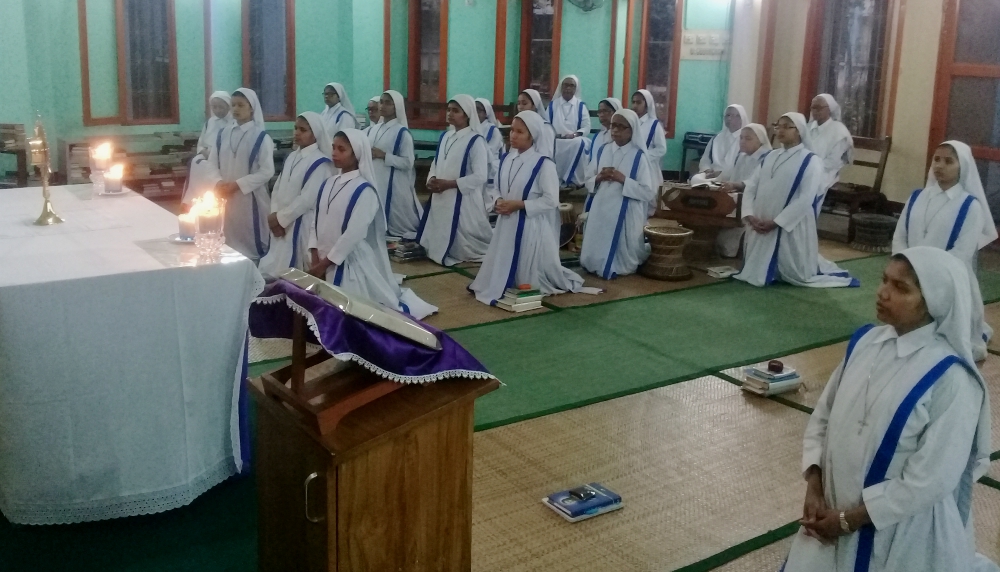
Sisters of the Mary Queen of the Apostles in Bangladesh: "Endless prayer is our day and night work." (Sumon Corraya)
During a visit to their convent April 3, the sisters were brought to tears during their prayers. Within the convent, essentially a family, they stay about 2-3 feet away from each other. For the past two weeks, they haven't ventured outside their convent. While usually, the sisters serve in schools, hospitals, hostels, parishes and a handicraft training center, they now work at home as they can, grading students' papers and communicating via phone and email. They attend Mass organized by the Dhaka Archdiocese on Facebook Live.
The congregation has a total of 222 nuns in Bangladesh serving in 29 separate communities or convents in eight dioceses. They range in age from 25 to 90 years old, and none has been infected with COVID-19 so far. The congregation also has six sisters serving in Padua, Italy, as missionaries, caring for elderly people in a nursing home.
To protect themselves, the sisters in the Dhaka convent clean their house several times each day and wash their hands frequently with soap or use hand sanitizer.
"We take extra care with our elderly nuns so that they can be safe and well from COVID-19," Sister Mary Lily said. "We have kept ready a separate room in our all convents if nuns become infected."
Colombia
Missionary Carmelites
Following the global trend, the Missionary Carmelite sisters in Bogotá, Colombia, are taking their education ministry online, coordinating not just online classes, but also offering online spiritual guidance and prayers for families, said Sr. Leida Holanda Dájome. Four sisters teach alongside their lay counterparts. And to help parents, the school's directors of each age group send video messages to assist parents in helping children with schoolwork.
With the school's families being largely lower-middle-class, each home tends to have one computer, often causing complications for students whose parents may also be working from home. Holanda said they are sensitive to this problem and have been making the transition incrementally and with a lot of guidance for the parents.
'When we ask ourselves what our role is in this moment, we believe that we are to be bearers of hope.'
—Sr. Leida Holanda Dájome
Aside from coordinating online education, Holanda said her community life has been relatively untouched — if anything, it's been enhanced.
"We have more time for each other, more time for the spiritual," she said, adding that they've extended their prayer hours. "We haven't been bored," as conversations go longer and time is filled with prayer.
"It's been an adjustment at every level, academically, professionally and personally," Holanda said, adding that they've been connecting with multiple conferences and confederations along the way — the bishops' conference, the Confederation of Latin American and Caribbean Religious (CLAR), and the National Confederation of Education — and "all of that helps us maintain a sense of calm."
"We have this much clear: that we need to be bearers of hope for our kids, for their parents, and take into consideration that we're all immersed in this situation," she said. "That'll help us see this differently, in thinking about our relationships, in revisiting our values, and how we together all become a new creation. When we ask ourselves what our role is in this moment, we believe that we are to be bearers of hope. We're all networked and together."
Nigeria
Religious Sisters of Charity
Presently observing the 14-day lockdown the Nigerian government announced March 29, the Religious Sisters of Charity in Lagos, Southwest Nigeria, are still living their spiritual vows while maintaining self-isolation and social distancing.
The congregation has a regional house that serves as the country's administrative headquarters with five sisters. Three other communities with four, six and four sisters, respectively, are spread out across different cities in the state. The sisters work in education, health care and social pastoral ministries that have all been shut down.
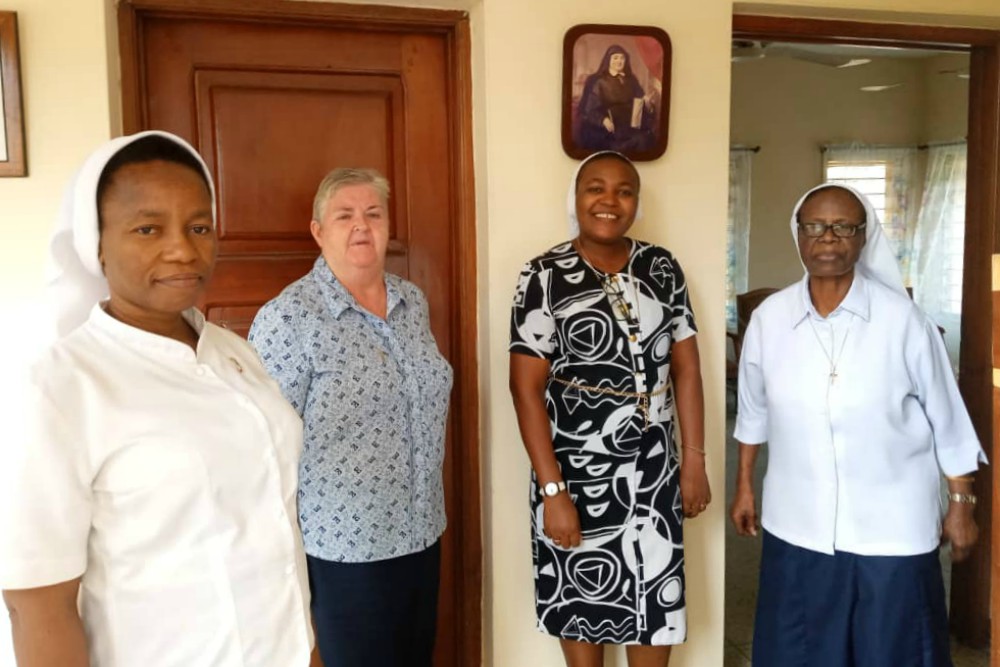
The Religious Sisters of Charity in Lagos, Nigeria, say the global pandemic is a difficult moment for them. (Courtesy of the Religious Sisters of Charity)
"It's a difficult moment for us, and we are in solidarity with the world, especially sisters who work in hospitals and clinics," Sr. Gloria Ozuluoke said. The community maintains social distancing and recommended hand-washing protocols.
Each day at 6 p.m., the sisters gather at the chapel inside the community to pray for an end to the health crisis. People who live nearby used to join the sisters during Mass with a priest, but since the outbreak, movements and visitors have been restricted. On March 20, the archdiocese in the state suspended Masses for a month.
During breakfast, lunch or dinner, the sisters come together to share meals with seats spaced out.
"We are conscious of the situation and take precautions and measures," Ozuluoke said. "Life is still normal in the community, but we are not relaxing about it. We also ensure that we maintain a high level of hygiene by washing hands with soap and the use of sanitizer. We know that if anyone falls ill, we obviously know what to do, and we practice self-isolation."
Two older sisters in the community — one in her 60s and the other above 70 — do not go out because they are part of the vulnerable groups, Ozuluoke said. Younger sisters have always done routine duties, even before the outbreak.
"They are healthy and do their normal work and are well-informed about the virus because we have a WhatsApp group where we share information and tips," she said. "Before the virus even got to Nigeria, we used the platform to share information among us."
Philippines
Missionary Benedictine Sisters
Some sisters in the community of the Missionary Benedictine Sisters in Manila started a daily rosary with the neighborhood by praying at the congregation's front gate over a loudspeaker so neighbors can join in, said Sr. Mary John Mananzan, former prioress and now the college's vice president for external affairs.
The congregation runs its flagship school, St. Scholastica's College, which is now closed. The quarantine, which runs until April 30, hasn't disrupted community life that much, except to lessen the absence of individual sisters because of meetings on campus, said Mananzan, one of 10 sisters who oversee the college and live in community. Another 23 sisters live in the priory house, which is in the same campus compound. The congregation's entire Philippines province has 162 sisters.
Convent Masses are still allowed in the Philippines, so since a priest lives nearby, the 10 sisters in Mananzan's community can still attend daily Mass, observing social distancing, but people in the neighboring community are not allowed to join. The congregation is planning a simplified celebration of Holy Week.
The congregation is also sheltering 18 people, two families and seven individuals, at Tuluyan ni San Benito, a drop-in shelter for those who are homeless, according to volunteer Mariciel Moises. Because of the lockdown, they cannot go back to the streets where they spend most of their waking hours, scavenging for scraps that can be recycled.
Advertisement
Sr. Theodora Bilosura is Tuluyan's project coordinator, but the lockdown has prevented her from going to the place from her convent a block away. But Tuluyan has six lay volunteers who keep the place running efficiently.
Unlike during regular times, when shelter but not food is provided, those currently in Tuluyan are given food. The staff with quarantine passes take turns going to a nearby market.
In the meantime, while Tuluyan's homeless clients are "locked in," the volunteers are creating activities so that the homeless remain occupied. Some help in cleaning; others help cook. In the afternoons, the volunteers conduct reflection sessions with them.
South Korea
Olivetan Benedictine Sisters
International authorities praised South Korea for its containment of the virus, said Sr. Michael Yoo of the Olivetan Benedictine Sisters of Busan, executive secretary of the Association of Major Superiors of Religious Women in Korea.
The reason for the success is due to widespread testing, Science magazine reported, with more than 270,000 people tested, "which amounts to more than 5,200 tests per million inhabitants — more than any other country except tiny Bahrain," the publication noted.
In an email, Yoo told GSR that even when the confirmed cases in South Korea were still low — fewer than five at the end of January — the association of superiors decided "to keep their communities' external events, including a perpetual vow mass, as simple as possible." By mid-February, with growing concern for "community infection, all dioceses stopped public masses and meetings as preventive measures."
Since a large number of sisters live in local parishes to help with pastoral work, "they have been keeping social distance, using this period for their annual retreat and intensive prayer time." Priory houses are not receiving any outside guests now, Yoo wrote in her email.
'This Covid 19 crisis paradoxically has made us truly united spiritually.'
—Sr. Michael Yoo
Yoo lives in a local parish with two other sisters and has been working from home, with some limited commuting to her office.
"I stay inside except for the commute," she wrote.
As for her congregation in Busan, South Korea's second-largest city, Yoo said 130 members live together in the priory house and are avoiding all "external activities" except for what is absolutely necessary, and those returning to the house "must keep a self-isolation period whenever they come into the priory house from outside."
Some limited ministry work continues, including providing snacks to frontline medical workers at a COVID-19 screening center.
Prayer has become even more important to the sisters.
"This Covid 19 crisis paradoxically has made us truly united spiritually," she wrote. "We are praying that God grants all of us the courage and wisdom so that we overcome this crisis as soon as possible."
United States
Benedictine Sisters of Mount St. Scholastica
Making masks and homemade hand sanitizer with 151-proof alcohol are two projects occupying some of the sisters at the monastery, which has put in place a number of protective measures, according to Sr. Esther Fangman, the community's prioress.
The congregation of about 100 sisters in Atchison, Kansas, including 38 in a 40-bed nursing facility, separated the nursing facility from the monastery, with two sisters from the monastery assisting the nursing staff. There are designated sisters who go out to get supplies or take people to a health care facility, scrubbing the car and themselves when they return.
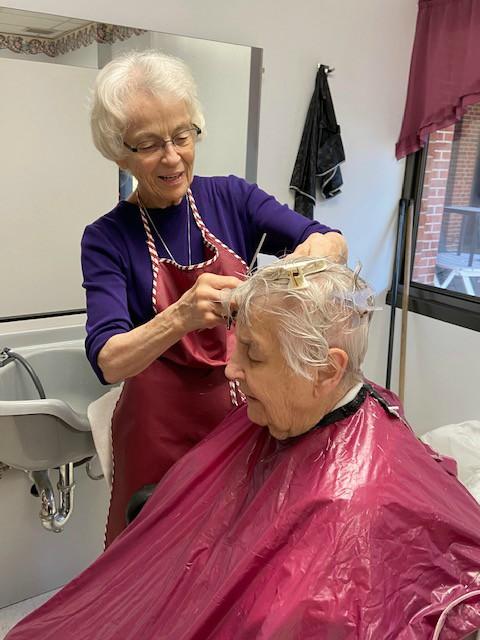
Sr. Micaela Randolph of the Benedictine Sisters of Mount St. Scholastica cuts Sr. Jeanne d'Arc Kernion's hair. Randolph, who worked as a hairdresser at the age of 19 before becoming a sister, volunteered to cut her sisters' hair, as they cannot leave their monastery in Atchison, Kansas, because of the coronavirus pandemic. (Courtesy of the Benedictine Sisters of Mount St. Scholastica)
Some sisters in their 80s and 90s are serving in the meal lines so other sisters don't have to touch serving utensils. Sisters are still eating in community, but with three to a table with space between the tables. Social distancing is also in place at the chapel, in which prayers are continuing with no eucharistic service.
"People are extremely cooperative," she said. "If you put up a list, people will sign up to help."
Sr. Micaela Randolph, 84, volunteered to cut sisters' hair, drawing on skills learned as a hairdresser at age 19 before becoming a sister.
The nursing staff helps sisters at the nursing center with iPads and FaceTime, Fangman said. One younger sister wrote notes that were put on the outside of each sister's window. Three of the sisters who had traveled outside the Atchison area before the no-travel order had to be quarantined when they returned. One of the sisters had a birthday in quarantine, so other sisters stood outside her window and sang happy birthday.
In preparing a recent homily, Fangman said: "We may be deprived of the consecrated Eucharist, but we are not deprived of each other. We have each other in the presence of God and each other. God is in every single person. We haven't lost Christ in this."
Dominican Sisters of Hope
The Dominican Sisters of Hope, which has about 130 sisters in 15 states and Puerto Rico, have taken the videoconference trend a step further, scheduling regular online reflections, prayers and listening sessions.
The sessions tend to be discussions or reflections on a particular reading, such as a recent conversation on a Sojourners article on the tension between American individualism and the need for community during a pandemic, said Sr. Catherine Walsh, who is a member of the leadership team.
With around 40 participants, the online sessions are inclusive, with Dominican Sisters of Hope chatting alongside laypeople or sisters from other congregations, configured into smaller groups to share reflections. During the listening session, Walsh said, the conversation was not about fear, but the desire to share community, to hear how people are coping and finding ways of outreach.
"If anything, people are frustrated they can't do more for neighbors," she said.
"I live in a house of four people and a dog, so I have community all the time," Walsh said. "But for people who are isolated and alone, it gave a great sense of being able to reach out and for those folks to be able to reach back. ... It's a great opportunity to discover what community really means, and that's relationship."
Walsh lives with a 93-year-old sister who lived through the Great Depression and World War II, and she tells Walsh that she's "never seen anything like this." Walsh echoes that "it's the scariest thing that's ever happened in my life."
But "there's a reliance on God and on one another, and we have to share community from the depths of prayer. Religious life has prepared me for this."
Loretto Community
Like in many congregations, Loretto Community's 11 sisters and more than 35 co-members in the Littleton, Colorado, area are using technology to bridge the social distancing the pandemic requires.
Sr. Catherine Mueller, a member of the leadership team and a past president, said the entire community of Sisters of Loretto around the world, about 130 sisters and 195 co-members, joined in a videoconference call about COVID-19 prevention and restrictions in mid-March open to every sister who could join. Those who couldn't participate were able to watch it on closed-circuit television.
"We have a communication system — we call it a bulletin board — that sends out an email with updates from all over the community," Mueller said. "That usually goes out twice a week, but now we're doing it four times a week. One of those four is very specific to things you can do other than gathering with other people," such as going for individual walks or reading.
Because the sisters in the infirmary have been completely isolated, all community members were invited to make a short video greeting for them. Those were edited together and are being shown on the closed-circuit television system.
"Some use humor, some made little travelogues. One was made on the first day of spring, when we had snow in Denver, so she showed everyone the snow," Mueller said. "One sister said to me that the thing she appreciates in any kind of time is that we enjoy being together and laughing together."
She said the forced isolation has made sisters draw closer in other ways.
"A lot of people are making phone calls. There's a lot of emails, there's a lot of kindness," Mueller said. "It's that whole sense of, even in isolation, there's still a strong community."
And a new appreciation for things previously taken for granted.
"Someone said that all of the sudden, they appreciated being in Zoom gatherings much more than she ever did before," Mueller said.
Sisters of St. Joseph of Peace
With one of its regional centers in Bellevue, Washington, one town away from Kirkland, where the initial coronavirus cases were identified in the United States in late January, killing more than a dozen nursing home residents, the Congregation of the Sisters of St. Joseph of Peace was on high alert early in the crisis, said Sr. Susan Francois, a leadership team member. There are 130 sisters in England, New Jersey and Washington state.
The congregation closed its Peace and Spirituality Center in Bellevue in early March, including to a doctors' group that had planned to use it for reflection days. "It's strange that in our tradition of hospitality, we had to close our doors, but that's what we had to do," she said.
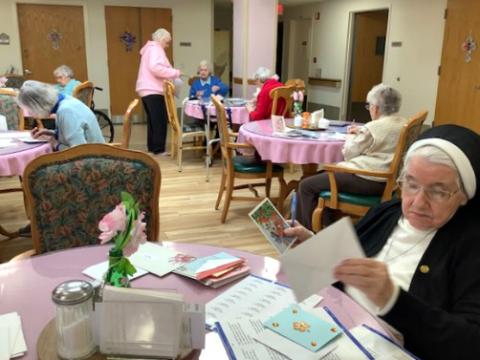
Sisters of St. Joseph of Peace at the St. Michael Villa in Englewood Cliffs, New Jersey, write notes to residents of Peace Care St. Ann's and Peace Care St. Joseph's, the two long-term care facilities in Jersey City that cannot have visitors during the COVID-19 crisis. (Courtesy of the Sisters of St. Joseph of Peace/Margaret Jane Kling)
The community of St. Mary-on-the-Lake in Bellevue has had no COVID-19 cases, Francois said, and tight restrictions — essential staff only — are designed to keep it that way. In New Jersey, the Holy Name Medical Center, which the congregation sponsors, has been slammed, she said.
"We were at the two ground zeros in the U.S., and England is also taking it seriously," she said. "Our sisters are powerhouses of prayer. They take seriously their role as prayer partners."
Sisters also write notes to staff and residents at the nursing homes the congregation sponsors and the hospitals that are part of its legacy. Sisters share daily reflections for the medical staff.
"It shows in a beautiful way how the relationship continues with the ministries that are our legacy and that our sense of community increases in ever-expanding circles," she said.
With the New Jersey community on the Hudson River overlooking New York City, "prayer and concern is first and foremost on all of our hearts and minds," she said.
Even as sisters, under the stay-at-home restrictions, "we live in small tight circles so we're going to annoy each other just like everyone else does," she said. "In this way, we are no different than any other family stuck at home together."
Many sisters live in small groups of two to four, with the benefit of the larger regional facilities that have more space and people.
The congregation is adept at using Zoom and is going ahead with planning for a chapter meeting this summer, but using video calls for the spring assembly meetings that are part of that process, she said.
"We've always had distance and unity," she said, but with the benefit of modern technology, "even though we're so far apart, we're still connected."

The New York City skyline from the Sisters of St. Joseph of Peace's New Jersey community. The community is one of two near epicenters of the coronavirus outbreak in the United States. The other is in Bellevue, Washington, one town away from Kirkland, where the initial coronavirus cases were identified in the United States in late January. (Courtesy of Sr. Susan Rose Francois)
[Doreen Ajiambo, Sumon Corraya, Gail DeGeorge, Ma. Ceres P. Doyo, Patrick Egwu, Chris Herlinger, Soli Salgado and Dan Stockman contributed to this report.]

